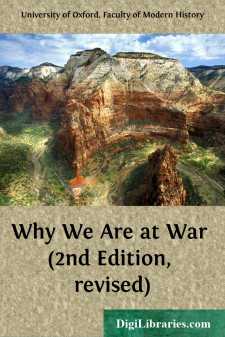Categories
- Antiques & Collectibles 13
- Architecture 36
- Art 48
- Bibles 22
- Biography & Autobiography 813
- Body, Mind & Spirit 142
- Business & Economics 28
- Children's Books 17
- Children's Fiction 14
- Computers 4
- Cooking 94
- Crafts & Hobbies 4
- Drama 346
- Education 46
- Family & Relationships 57
- Fiction 11829
- Games 19
- Gardening 17
- Health & Fitness 34
- History 1377
- House & Home 1
- Humor 147
- Juvenile Fiction 1873
- Juvenile Nonfiction 202
- Language Arts & Disciplines 88
- Law 16
- Literary Collections 686
- Literary Criticism 179
- Mathematics 13
- Medical 41
- Music 40
- Nature 179
- Non-Classifiable 1768
- Performing Arts 7
- Periodicals 1453
- Philosophy 64
- Photography 2
- Poetry 896
- Political Science 203
- Psychology 42
- Reference 154
- Religion 513
- Science 126
- Self-Help 84
- Social Science 81
- Sports & Recreation 34
- Study Aids 3
- Technology & Engineering 59
- Transportation 23
- Travel 463
- True Crime 29
Why We Are at War (2nd Edition, revised)
Description:
Excerpt
CHAPTER I
THE NEUTRALITY OF BELGIUM AND LUXEMBURGI
The kingdom of Belgium is a comparatively new creation, but the idea of a Belgian nation is older than the kingdom. Historically and geographically the kingdom has no doubt an artificial character; its boundaries have been determined by the Great Powers and cut across the ancient provinces of the Netherlands. And it must be added that its population is heterogeneous both in race and language. These facts, however, in no sense diminish the legal rights of Belgium as a nation. She is a sovereign state by the same charter as Italy or Greece; and for the convenience of Europe she has been solemnly declared a neutral state, endowed with special privileges but burdened with corresponding obligations. While those privileges were maintained—and they have been rigidly maintained for more than eighty years—the Belgian people punctually fulfilled their obligations; and, because they have declined to betray Europe by becoming the dependant of a powerful neighbour, or by participating in the violation of European public law, their country is a wilderness of smoking ruins.
In the tremendous and all but crushing ordeal of August, 1914, Belgium has proved that she possesses other titles to existence and respect than those afforded by treaties, by the mutual jealousies of neighbours, or by the doctrines of international law. She has more than satisfied the tests which distinguish the true from the fictitious nationality. Those who have hitherto known Belgium only as a hive of manufacturing and mining industry, or as a land of historic memories and monuments, are now recognizing, with some shame for their past blindness, the moral and spiritual qualities which her people have developed under the aegis of a European guarantee. It is now beyond dispute that, if Belgium were obliterated from the map of Europe, the world would be the poorer and Europe put to shame. The proofs which Belgium has given of her nationality will never be forgotten while liberty has any value or patriotism any meaning among men. We cannot do less than echo the general sentiment of admiration for a constancy to national ideals which has left Belgium at the mercy of Huns less forgivable than those of Attila. But the case against her oppressor is not to be founded solely or mainly on her peculiar merits. In a special sense it rests upon the legal rights and duties with which she has been invested for the convenience of her neighbours and for the welfare of the European state system. It was in their interest, rather than her own, that the Great Powers made her a sovereign independent state. As such she is entitled, equally with England or with Germany, to immunity from unprovoked attack. But the Powers which made her a sovereign state, also, and for the same reasons of convenience, made her a neutral state. She was therefore debarred from consulting her own safety by making alliances upon what terms she would. She could not lawfully join either of the two armed camps into which Europe has fallen since the year 1907....


